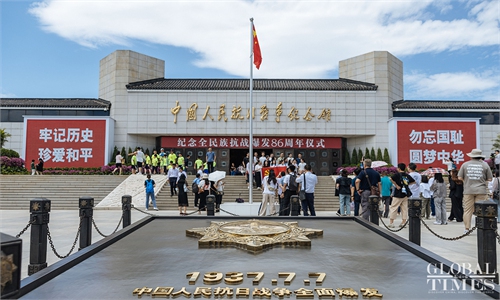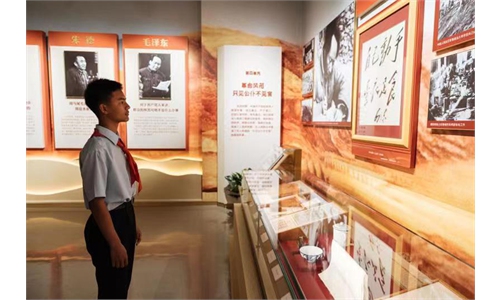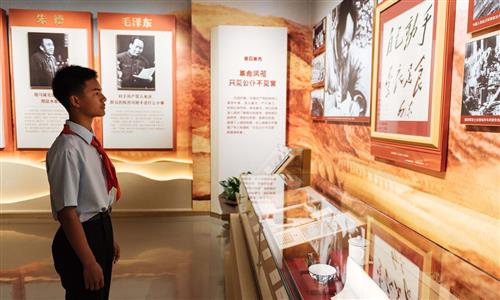IN-DEPTH / IN-DEPTH
Facts, lessons still need to be told 78 years after Japan surrender in war
Justice must prevail
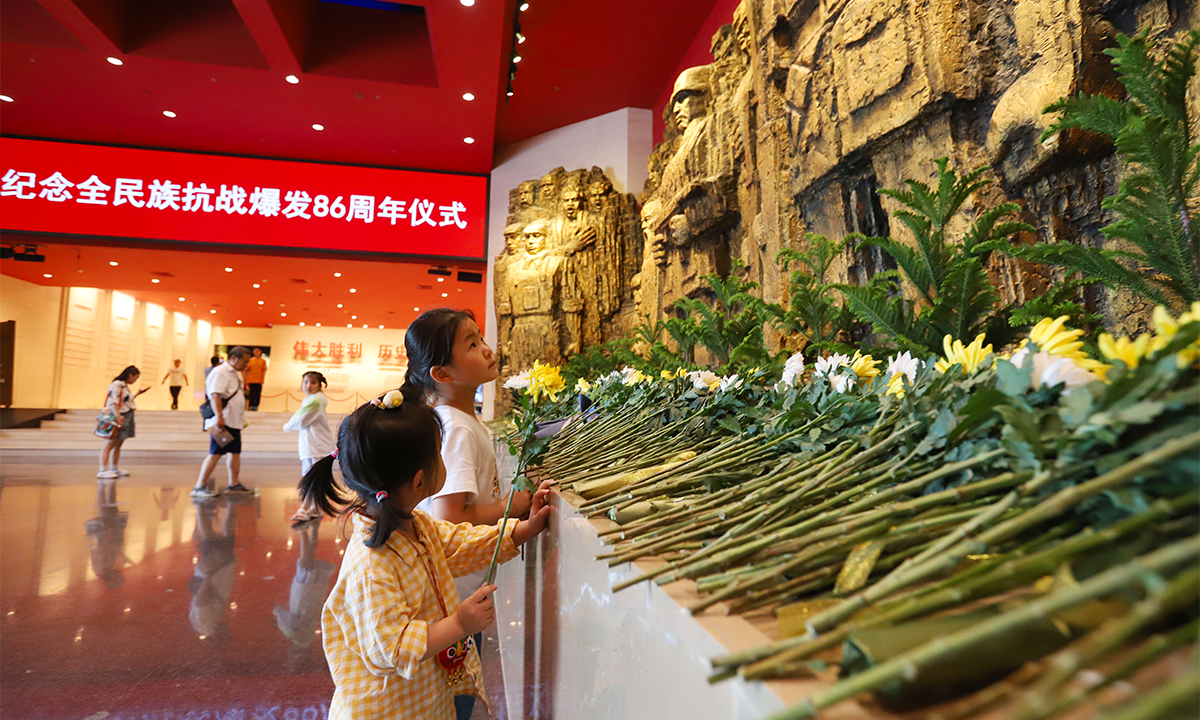
Children visit the Museum of the War of Chinese People's Resistance against Japanese Aggression and present flowers in honor of those who sacrificed their lives in the War of Resistance against Japanese Aggression, in Beijing, on July 7, 2023. Photo: VCG
Seventy eight years ago, the Japanese government officially announced its unconditional surrender, signifying the end of World War II and the victory of people worldwide against fascism. Despite post-war efforts by the Allied powers, Japan's war criminals were subjected to appropriate trials and penalties.
However, the specter of Japanese war criminals still looms as they are enshrined in the Yasukuni Shrine in Tokyo, with occasional open visits by Japanese politicians, and attempts by right-wing forces to distort historical facts have never ceased. The Yasukuni Shrine honors 14 Class-A convicted war criminals among 2.5 million Japanese war dead from WWII and is regarded as a symbol of past Japanese militarism.
At the same time, in countries that suffered aggression, including China and South Korea, the hardships endured by people during the war and the unwavering spirit of anti-aggression heroes have never been forgotten. Activists have been steadfastly advocating for peace.
"By understanding our history, we cherish peace even more," Luo Cunkang, Party Secretary at the Museum of the War of Chinese People's Resistance against Japanese Aggression, also the secretary-general of the International WWII Museum Association, told the Global Times.
"In the current complex and turbulent international environment, commemorating that period of history holds even greater significance. It will bolster our determination and courage to uphold peace in the face of challenges," he noted.
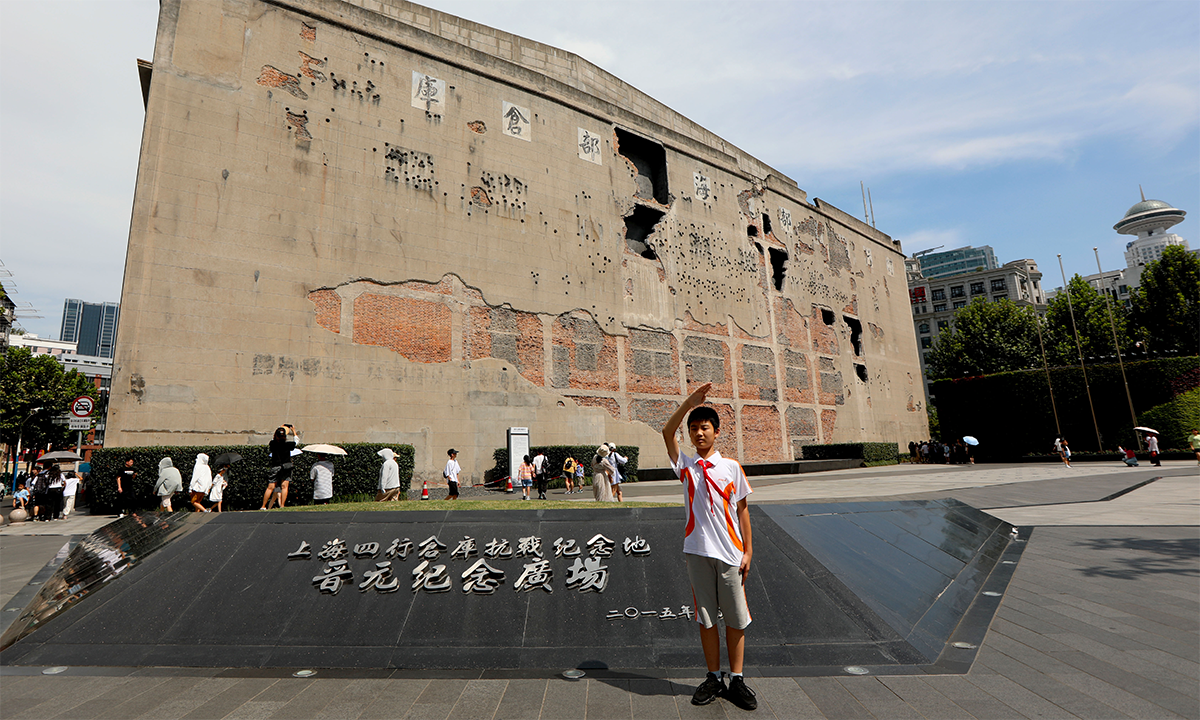
A Chinese teenager poses in front of the Sihang Warehouse Battle Memorial in Shanghai, on August 13, 2023. Photo: Chen Xia/GT
Never forget
On Sunday, two days before August 15, visitors flooded the Sihang Warehouse Battle Memorial near Shanghai's landmark Huangpu River, to commemorate the 86 anniversary of the Battle of Shanghai - one of the fiercest and bloodiest battles in the War of Resistance against Japanese Aggression (1931-45).
The memorial was built at the site of the Sihang Warehouse defense battle that took place in downtown Shanghai in October 1937. The defense battle was well known all over China and the world because of China's war epic The Eight Hundred, which once topped the global box office in 2020.
The memorial held a series of commemorative activities on the day to mark the 76th anniversary of the Battle of Shanghai, including showcases of themed choruses, instrumental ensembles, poetry recitations, and a history lecture.
"We hope those who visited the memorial and participated in the activities will know more about and remember the history [of the war]," the memorial's director Ma Youjiong told the Global Times.
Starting from the Japanese-initiated "September 18 Incident" in 1931, the Chinese people engaged in a relentless and arduous struggle against Japanese aggressors for 14 years. The War of Resistance against Japanese Aggression was an important component of the World Anti-Fascist War. The Chinese People's War of Resistance against Japanese Aggression was the earliest to start, the longest-lasting, and latest to end.
Having sustained military and civilian casualties numbering over 35 million, accounting for one third of total casualties during WWII, and suffering economic losses worth $600 billion as calculated according to 1937 rates, the Chinese people finally defeated the Japanese militarist invaders.
In Beijing, students who are in summer vacation pour into the Museum of the War of Chinese People's Resistance against Japanese Aggression, listening to the stories of the wartime history.
The exhibition hall is always bustling with activity. Many parents patiently and meticulously recount the stories to their children, allowing them to better appreciate the iconic artifacts and classic photographs on display. "I believe this is the best form of education," said Luo.
Located near the Lugou Bridge, where the invasion by the Japanese soldiers started in 1937, the museum is an important patriotic education center. It has a series of activities to commemorate August 15, as well as September 3, China's Anti-Japanese War Victory Day.
According to Luo, the museum will also air a live broadcast online, focusing on content related to August 15, 1945, when Japan announced its unconditional surrender and the Chinese people celebrated the victory of the War of Resistance against Japanese Aggression. On September 3, the museum will host volunteer themed musical activities.
The museum is also planning to invite students from the island of Taiwan, Hong Kong, and Macao special administrative regions to Beijing to visit the museum. "During the war, compatriots from all parts of China were united as one. The history of heroic struggle will help to enhance the emotional bond among these young students," Luo said.
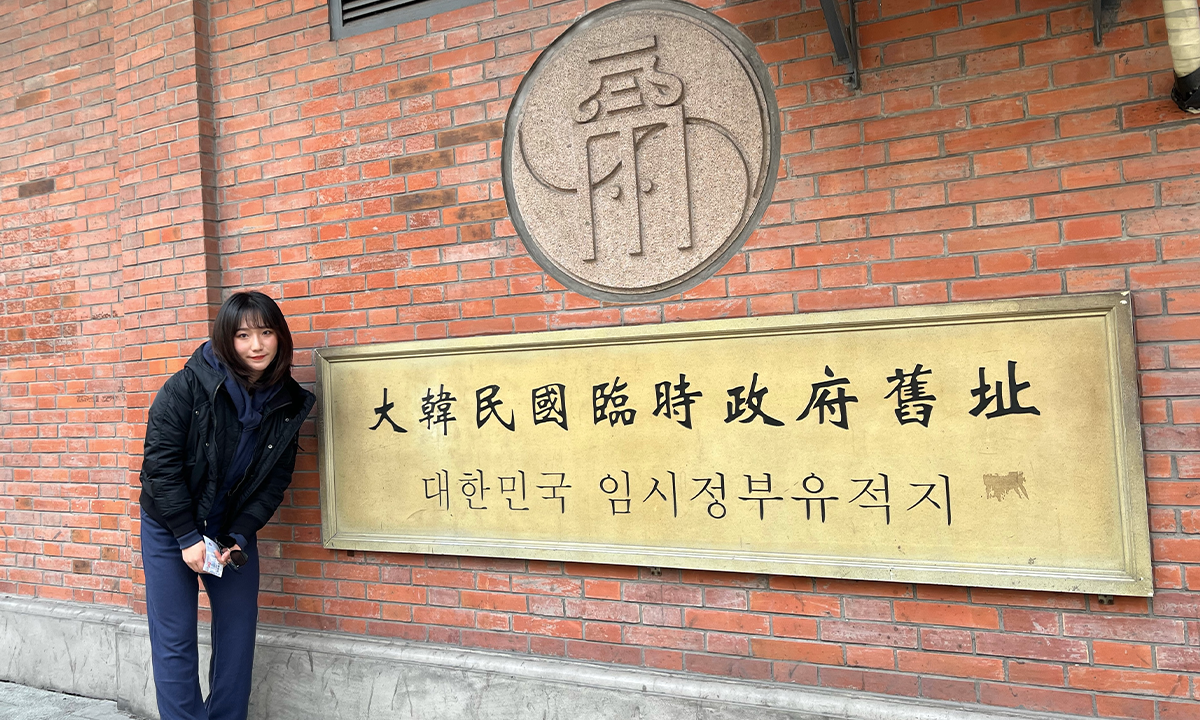
Baek Seo-Hui, a Korean student studying for a master's degree at Fudan University in Shanghai, visits the site of the Provisional Government of the Republic of Korea in Shanghai on March 1, 2023. Photo: Courtesy of Baek
Shared recollections
The wars of aggression launched by Japanese imperialists are a source of shared, deeply painful memory in China and the Korean Peninsula.
Chinese and Korean people joined forces to fight against the imperial Japanese army during the years of hardship. There are sites of the Korean Provisional Government in several Chinese cities including Shanghai, which witnessed patriotic Koreans set up overseas Korean Provisional Governments to continue their independence movements against atrocities committed by the Japanese army.
Baek Seo-Hui, a South Korean student studying for a master's degree at Fudan University in Shanghai, visited the site of the Provisional Government of the Republic of Korea in the city's downtown Huangpu district earlier this year.
"That day was March 1, the [104th] anniversary of Korea's March First Movement," Baek told the Global Times. The movement was a series of demonstrations for Korean national independence from Japan imperialism starting on March 1, 1919.
Baek met many Korean visitors at the site that day. "The site is a place of historical significance," she said. "There, I felt the spirit of dedication and sacrifice in Korean independence efforts. Occasionally I might think that, there wouldn't be 'me' and 'a peaceful world' today without their [efforts] at that time."
The August 15 anniversary is a memorable day for people in both China and the Korean Peninsula. The day is also called the National Liberation Day of Korea, a day that the peninsula ended 35 years of Japanese colonial rule, Baek said.
"Similar to China, we hold many commemorative activities on August 15, each to mark this special day, such as Liberation Day memorial ceremonies, lectures, and competitions organized for the teens," she added.
In September 2022, the "China-Korea Joint Resistance against Japan" special exhibition opened at the Museum of the Chinese People's War of Resistance against Japanese Aggression. The exhibition serves as a collective remembrance and retrospective of the historical struggle of the Chinese and Korean peoples against the imperialist aggression of Japan. The exhibition showcased events spanning from 1910 to 1945, during which China and Korea fought side by side against Japanese imperialist colonization and aggression, ultimately achieving victory.
Luo remarked that in modern history, China and Korea share a similar destiny, forming a historical narrative of mutual support and united resistance against Japanese imperialism. This chapter of history requires further exploration, organization, and research by both China and South Korea, to be widely disseminated within the societies of both nations.
"We must draw enlightenment from history and ensure that the tragedies of the past do not repeat themselves," Luo said. "Our engagement in providing education on these historical events is not to perpetuate hatred, but the undeniable truth must not be denied, and justice must prevail. Both China and South Korea bear the obligation and responsibility to uphold this."
Japan has become increasingly aggressive in recent years in seeking to break free from its postwar pacifism. It actively seeks to revise the constitution so as to exercise the right of collective self-defense, ignoring the exclusively defense-oriented policy and seeking to "acquire the capability to strike enemy bases." In its 2023 Defense White Paper passed last month, Japan labeled China as its greatest security threat.
In May, Japan and NATO vowed to strengthen cooperation in space and cyberspace development to counter both China and Russia, a close interaction between the two sides after NATO said it plans to open a liaison office in Tokyo, the first of its kind in Asia.
Chinese analysts believe the NATO liaison office in Japan is no longer a symbolic move but a substantial move to build a so-called security defense around China. However, Japan's security can never be achieved by relying on the military support of the US or NATO. In fact, the more closely Japan cooperates with the US or NATO militarily, the less it will obtain the security it wants, and the less likely it will be able to change its image as a "geostrategic dwarf."
Meanwhile, South Korean President Yoon Suk-yeol announced in March that South Korea would no longer seek compensation from Japanese companies for the forced labor endured by Korean victims during WWII. The decision immediately sparked strong opposition from anti-war activists within South Korea. A 95-year-old South Korean senior citizen took to the streets once again, stating, "Even though I'm 95 years old, I can't die because it's unfair."
"When it comes to issues of historical understanding, it is reasonable to jointly demand for Japan to clearly acknowledge its wartime responsibilities, engage in continuous self-reflection on its war actions, and offer apologies and compensation. This line of thought aligns with normal expectations under such circumstances," Da Zhigang, director of the Institute of Northeast Asian Studies at the Heilongjiang Provincial Academy of Social Sciences, told the Global Times.
"If the current South Korean government chooses to more closely align with Japan in the future, it might lead to a regression in the acknowledgment of historical issues related to wartime atrocities," he said. "The prioritization of present-day interests could overshadow the recognition of its dark history."
China and Korea were the main victims of Japanese aggression, and were significant contributors to the victory of the world anti-Fascist war. Sentiments shared by many reached by the Global Times on the matter in both countries underline that the two sides can jointly work further in commemorating the victory in war, and urge Japanese right-wing forces to face up to history.
As China, Japan, and Korea are geographical neighbors and share close economic ties, how to smartly deal with diplomatic, economic, and people exchanges among the three nowadays has become an important issue concern, Baek said.
Remembering history doesn't equate to the blind hostility against Japan, noted Ma Jun, a research fellow at the Institute of History at the Shanghai Academy of Social Sciences. Ma also serves as the deputy director of the Shanghai Research Association of War of Resistance against Japanese Aggression and World Anti-Fascist War.
"While condemning Japanese right-wing forces, we can conduct normal, friendly exchanges with the antiwar people of Japan, which I think consists of the majority of today's Japanese society," Ma told the Global Times.


